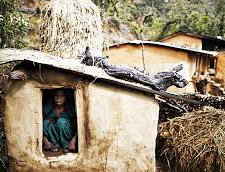
Chhaupadi has been outlawed by the Supreme Court in the year 2005, but it continues to exist. Although, the interim constitution of Nepal 2007, have envisioned the right to equality and social justice for women and girls but the target to achieve gender equality is not booming. Recognizing the “women reproductive rights as a fundamental right” by article (20)2, in Interim Constitution of Nepal, the entrenched tradition of chhaupadi practiced during menstruation cycle in mid and far-western regions of Nepal is leading haphazard health issues in women and girls.
Barriers to sexual and reproductive health rights include gender inequality, violence against women (VAW), social stigma and wretched belief in the society. This system is leading to chaotic circumstances for women facing sexual harassment and death following the isolated tradition.
Rather than others this system is enacted within Aryan community mostly in places like Humla, Kailali, Dailekh, Bajhang and Bajura which are prone areas to execution. Regardless, menstruation is perceived as a sin where women and girls are obstruct to enter the house, kitchen or visit temples. These restrictions are imposed by community than family to continue the practice.
Banishing women from the society during four days menstrual cycle is causing severe health issues. A major burden of disease is caused to women staying in unhygienic and filthy environment. Women are prone to cause various reproductive health issues like uterus infection, vaginal inflammation and white discharge. Regardless women and girls are also prone to cause general health problems, psychological problems, skin problems and environmental problems.
Lack of information regarding the health and hygiene and holding a long historical practice is misleading the people to risk the lives of women and girls. Abandoning the system and changing the perspective of the community people would take next few decades.
Despite various efforts of government and non-governmental organizations chhaupadi remains a vital issue leading to mental and physical abuse and life threatening risk due to rape and snake bites. As per law anyone who forces women and girls to practice chhaupadi will be liable to three-month sentenced prison with a fine of NPR 3000/- ($30). But many death cases goes unreported and barely any actions are taken on those who compel women to stay in shed.
The goal for ending the chhaupadi system is possible through sharing of knowledge by targeting the leaders of society, religious people and men and women of the community. Hence, for the sustainability of the change, providing proper counseling related to drawbacks of chhaupadi system through informative training sessions, campaign, discussions, street dramas and massive media involvement is mandatory.
Implementation of menstruation health management (MHM) program in schools and colleges will have an impact in the society. Hereafter, ending the generation long practice would be reliable through de-stigmatization of menstruation followed by a change leading from chow-shed to room and home to kitchen. To achieve a chhaupadi free society a relevant government line agencies from national to district level needs to be accountable for implementing the law passed by the Supreme Court to banned chhaupadi.

Shweta Singh
Shweta Singh is working as Research Monitoring and Evaluation officer in Adara Development. Conducting research in various fields and travelling to most remote parts of Nepal, her writing includes the real scenario of Nepal. She has gained experienced han
- Achieving The Target To Reduce Infant Mortality Rate
- Jan 26, 2019
















